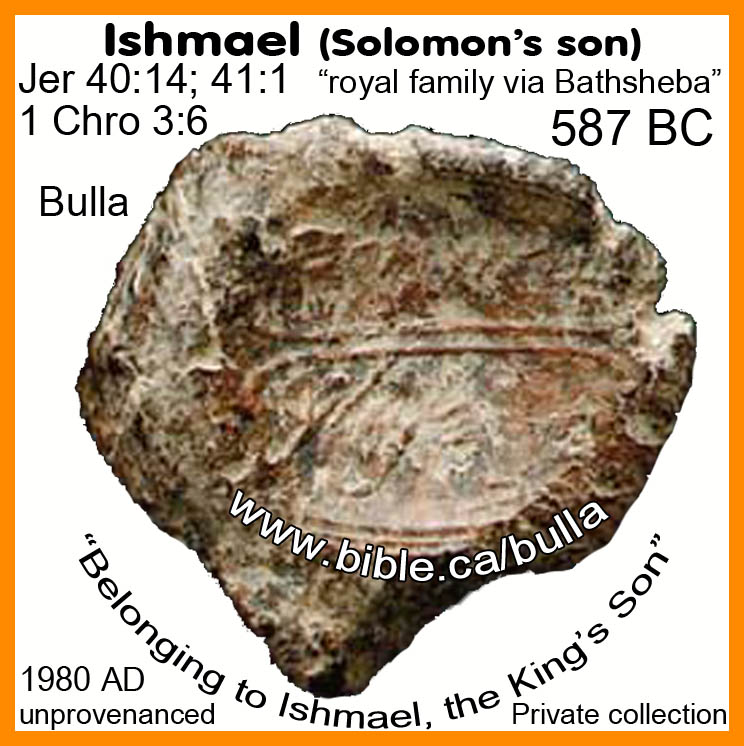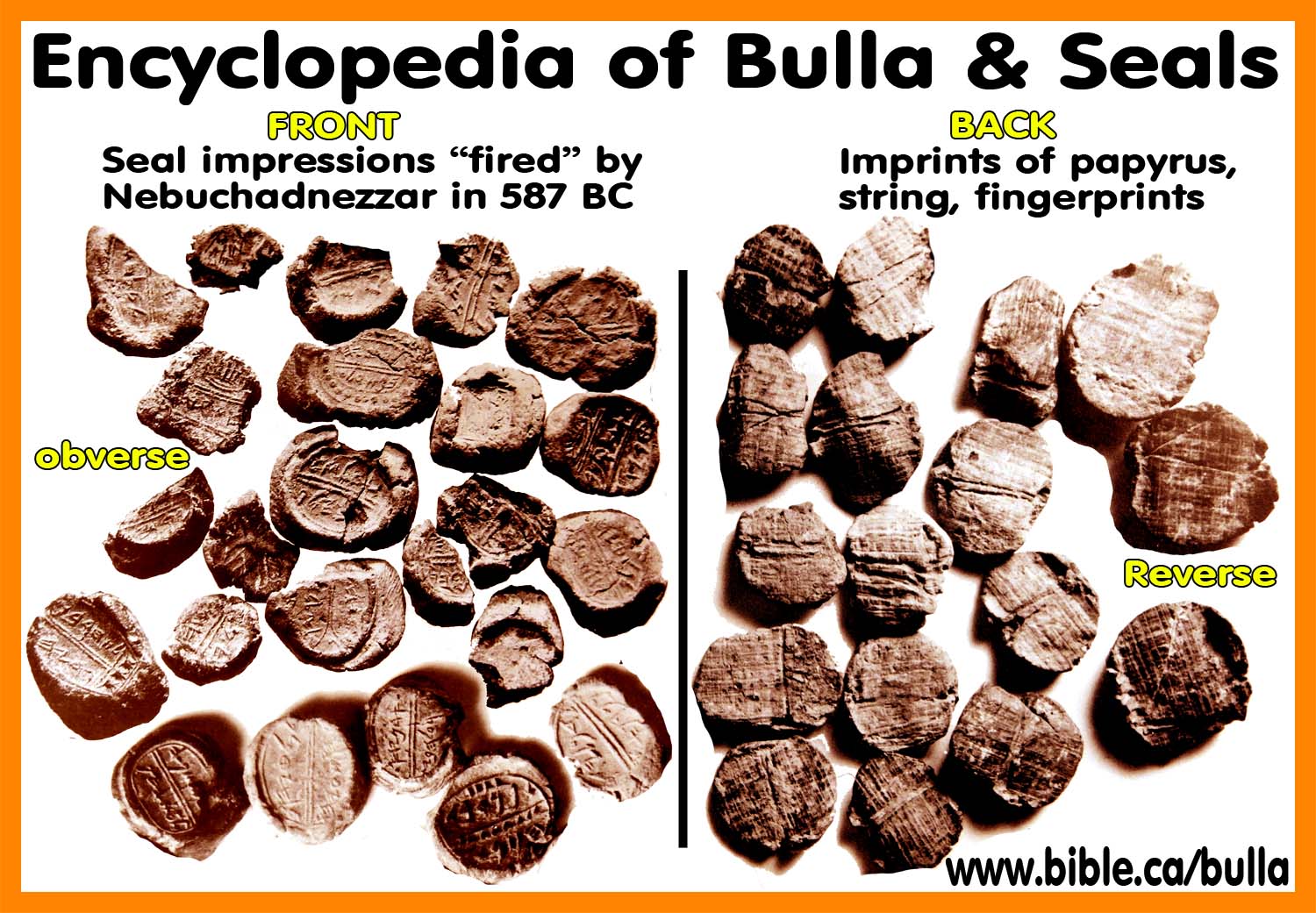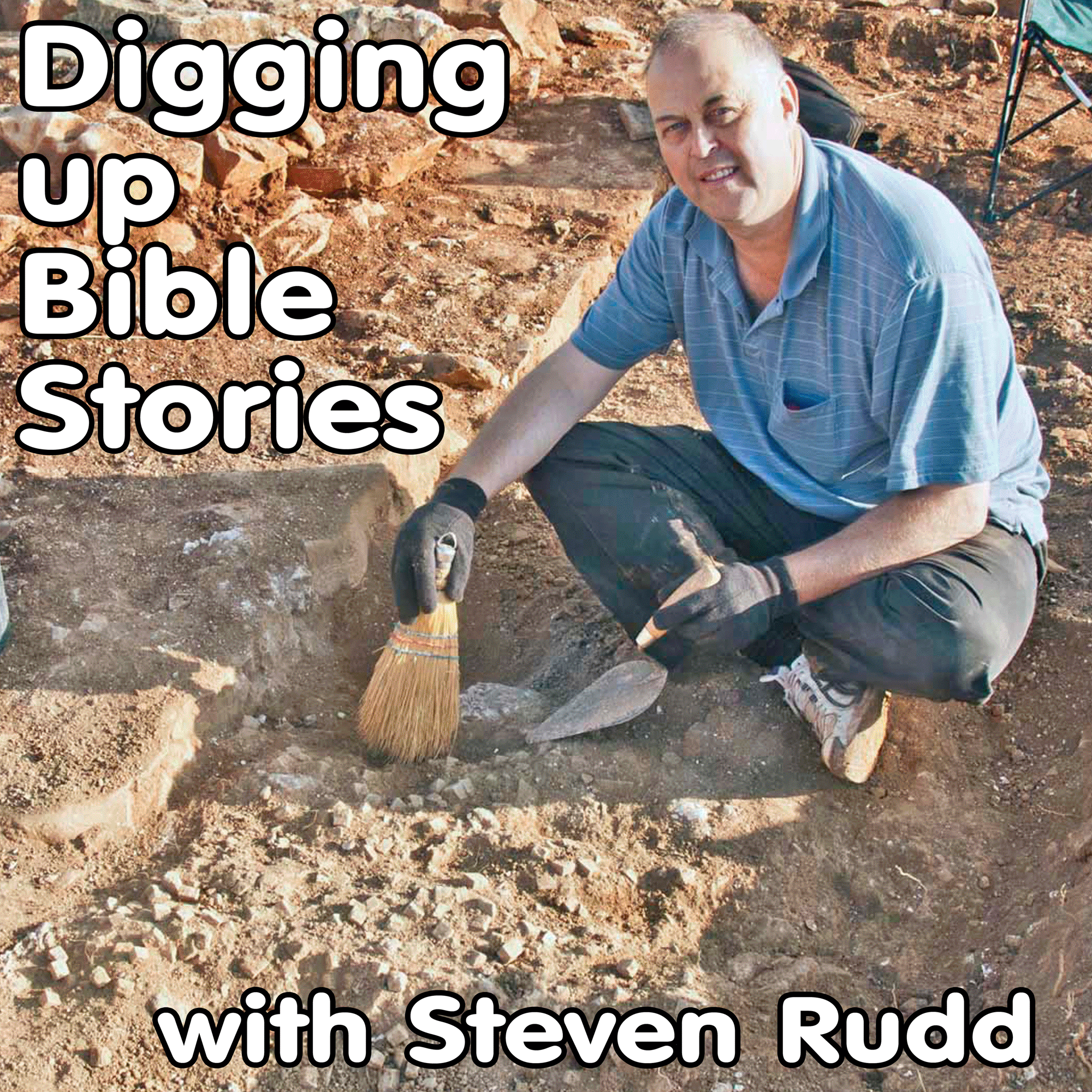Bulla of Ishmael the king's son (Solomon + Bathsheba)
Bible Bullae from Israel and Judah
|
Bulla of Ishmael Solomon's son "Archaeologists are digging up bible stories!!!" 1. Glyptic artifact: Clay Bulla 2. Inscription: "Belonging to Ishmael the king's son" 3. Provenance: None. Private antiquites market 1980 AD 4. Current location: unknown private collection 5. Date: 587 BC 6. Bible verses: 2 Kings 25:22; Jeremiah 40:13–41:4 7. Events: Gedaliah, 1st Judean governor appointed by Nebuchadnezzar in 587 BC, assassinated by Ismael and Baalis. |
|
|
||||||
|
Encyclopedia of Bullae and Seals: The Exhibit: On-line Museum of Bulla and seals Security: How bullae are made to seal papyrus Forgeries: Known fake bullae and seals |
||||||
|
|
||||||
|
Archaeologists are digging up bible stories!!! |
||||||
|
Archaeology is an important science that confirms the historical accuracy of the Bible. Since the Bible refers to hundreds of cities, kings, and places, we would expect to find evidence from on-site excavations. And this is exactly what we have found. The Bible is the most historically accurate book of history on earth. Read the Bible daily! |
|
|||||
|
|
||||||
Encyclopedia of Bullae and Seals of Judea and Israel
|
Bulla "belonging to Ishmael the king's son" |
See also Gedaliah governor
Ishmael, the king's son
Introduction:
1. In the story of the Assassination of Gedaliah there are six figures who bullae and seals we have uncovered from archeology.
2.
I. Ishmael the son of David, many generations removed through the clan of Elishama
1. Ishmael is the son of Nethaniah who is the son of Elishama. Neither Nethaniah or Elishama were kings.
2. The added note that Ishmael is "of the royal family" tells us he is not a current contender for the throne but is the son of a historic king. But which one?
3. Nethaniah is Ishmael's direct father as seen in Jer 40:14 which lacks the phrase "of the royal family" and lacks the "grandfather" Elishama.
a. "and said to him, “Are you well aware that Baalis the king of the sons of Ammon has sent Ishmael the son of Nethaniah to take your life?” But Gedaliah the son of Ahikam did not believe them." (Jeremiah 40:14)
4. When Elishama is mentioned as an ancestor it must be significant in some way, since in two passages when Elishama is named the phrase "of the royal family" is also present.
5. Elishama therefore is the connection with the king and the only possible king that could be is David.
a. Surprisingly David had two children named Elishama through Bathsheba.
b. In the listing below all 13 children were born to David through Bathsheba.
c. Solomon is the focus of the list and this explains why there were four before (and including) Solomon and 9 after Solomon.
d. "These were born to him in Jerusalem: Shimea, Shobab, Nathan and Solomon, four, by Bath-shua the daughter of Ammiel; and Ibhar, Elishama, Eliphelet, Nogah, Nepheg and Japhia, Elishama, Eliada and Eliphelet, nine." (1 Chronicles 3:5-8)
6. Even though Elishama was born to David and Bathsheba over 400 years before Ishmael, it was known that Ishmael was the son of David through Elishama.
a. Why did the writer not just say, "Ismael, son of Nethaniah, son of David"?
b. Just as sons of Aaron formed three priestly clans, so to the sons of David formed separate well known clans.
7. A possibility is that Ishmael was the unnamed son of some previous king of Judah and the custom was to refer to themselves as "the kings son", even though they were in fact several generations removed from the throne.
a. It cannot be Zedekiah because he was too young to father a grandson.
b. It is possible that Ishmael is the son of Nethaniah, and grandson of Elishama who in turn is the son of Josiah.
c. Zeph 1:8 shows a difference between princes (though who are contenders for the throne of the current king) and the king's sons (those who were the sons of kings several generations in the past and not contenders for the throne).
d. "Then it will come about on the day of the Lord’s sacrifice That I will punish the princes, the king’s sons And all who clothe themselves with foreign garments." (Zephaniah 1:8)
8. This bulla is therefore undeniably authentic because no forger would ever go to the trouble of making a bulla that so obscurely and indirectly ties and unknown Ishmael to an unnamed king.
Bible verses:
1. "These were born to him in Jerusalem: Shimea, Shobab, Nathan and Solomon, four, by Bath-shua the daughter of Ammiel; and Ibhar, Elishama, Eliphelet, Nogah, Nepheg and Japhia, Elishama, Eliada and Eliphelet, nine." (1 Chronicles 3:5-8)
2. "and said to him, “Are you well aware that Baalis the king of the sons of Ammon has sent Ishmael the son of Nethaniah to take your life?”
3. Gedaliah the son of Ahikam did not believe them." (Jeremiah 40:14)
4. "But it came about in the seventh month, that Ishmael the son of Nethaniah, the son of Elishama, of the royal family, came with ten men and struck Gedaliah down so that he died along with the Jews and the Chaldeans who were with him at Mizpah." (2 Kings 25:25)
5. "In the seventh month Ishmael the son of Nethaniah, the son of Elishama, of the royal family and one of the chief officers of the king, along with ten men, came to Mizpah to Gedaliah the son of Ahikam. While they were eating bread together there in Mizpah," (Jeremiah 41:1)
6. "“Then it will come about on the day of the Lord’s sacrifice That I will punish the princes, the king’s sons And all who clothe themselves with foreign garments." (Zephaniah 1:8)
By Steve Rudd: Contact the author for comments, input or corrections.




